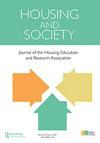Is cohousing good for democracy? Comparing political participation among residents of cohousing communities and traditional condominium developments
Q2 Social Sciences
引用次数: 2
Abstract
ABSTRACT This study assesses the argument that cohousing constitutes a politically fertile form of civil-society association, which hones political skills and cultivates political efficacy among residents, by comparing self-reported political participation levels of residents of cohousing and residents of condominiums. This design allows for more causal leverage than found in past research. However, the findings are still exploratory. Data from a nationwide survey of residents of cohousing and condominium developments in the U.S. were used to test the hypothesis that cohousing residents participate in politics at a higher level than do residents of condominiums. While the sample was small (n = 311), the results suggest both a strong self-selection effect among residents of cohousing and independent effects for involvement in housing-community practices and activism. The results also suggest that residents of condominiums increase their political participation due to cohousing-like practices and activism. Overall, the findings constitute a tentative step toward establishing causation, thus augmenting earlier research on cohousing as a form of civil society that fosters political engagement, and potentially bolster a civil-society case for repurposing condominiums into cohousing communities.合住有利于民主吗?比较合住社区和传统公寓开发项目居民的政治参与
摘要本研究通过比较同居居民和共管公寓居民自我报告的政治参与水平,评估了以下论点:同居构成了一种政治上肥沃的公民社会协会形式,它在居民中磨练政治技能并培养政治效能。这种设计允许比过去研究中发现的更多的因果杠杆作用。然而,这些发现仍然是探索性的。一项针对美国合租和共管公寓开发区居民的全国性调查数据被用来检验合租居民参与政治的水平高于共管公寓居民的假设。虽然样本很小(n=311),但结果表明,同居居民的自我选择效应很强,参与住房社区实践和行动主义的独立效应也很强。研究结果还表明,由于类似合租的做法和行动主义,共管公寓的居民增加了他们的政治参与。总的来说,这些发现是朝着确定因果关系迈出的试探性一步,从而加强了早期关于共同居住作为一种促进政治参与的民间社会形式的研究,并有可能支持民间社会将共管公寓重新调整为共同居住社区的案例。
本文章由计算机程序翻译,如有差异,请以英文原文为准。
求助全文
约1分钟内获得全文
求助全文
来源期刊

Housing and Society
Social Sciences-Urban Studies
CiteScore
2.30
自引率
0.00%
发文量
10
期刊介绍:
Housing and Society is the journal of the Housing Education and Research Association (HERA). The journal supports the mission of HERA by providing for the dissemination of research and other scholarly work. Submissions from a broad range of perspectives are encouraged. Topics in housing include: policy, design, social aspects, gerontology, behavioral aspects, energy/environment, equipment, interiors, economics, theory/model development, education, and program development or evaluation. The journal welcomes the submission of original research articles, notes and commentaries. Notes are shorter manuscripts presenting succinct information on housing related to one of the following categories: - Research: exploratory or not heavily theory-based or statistically analyzed - Academic: innovative teaching ideas - Program: development, implementation, and/or evaluation of Cooperative Extension or other housing programming efforts - Policy: examination of policy impact, comparative analysis, and/or need to achieve housing goals - Reviews: books, documentaries, etc.
 求助内容:
求助内容: 应助结果提醒方式:
应助结果提醒方式:


